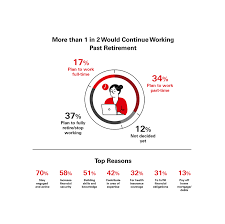HSBC's ‘Quality of Life Report’ examines the relationship between wealth and quality of life. 50% of individuals anticipate working after retirement due to financial concerns.
What is NPS and how does it help you save for your retirement? Should you invest?
HSBC recently released its “Quality of Life Report” which seeks to delve into the relationship between wealth and quality of life and evaluate if the association between the two can be measured in tangible terms. Wealth is not all about money but important facts and factors related to our life goals including retirement, holistic wellness, our investments, and the legacy we all leave behind. The survey explores the lifestyle and well-being of wealthy individuals from various age groups in nine distinct markets.
This detailed study explores the intricate connection between physical and mental well-being and financial health, providing insights into life goals, the significance of financial planning and readiness, and the changing dynamics of retirement. However, the first-ever survey within the report reveals how more than 50 per cent of individuals anticipate continuing to work after they retire.
The conducted survey uncovers a desire among the younger generation to retire earlier than their predecessors. However, the financial challenges associated with increased longevity and other obstacles have resulted in 85 per cent of respondents identifying financial concerns as a significant factor motivating them to engage in some form of work after retirement.
The younger generation thinks differently than their predecessors. There is an innate desire to retire early and pursue life in a different direction. The intent to get rid of the daily grind has caused many to plan their retirement early in their lives though many are still unsure of how to deal with financial challenges including increased longevity and obstacles surrounding financial concerns. The survey underscores how 85 per cent of respondents identified financial concerns as a significant factor motivating them to engage in some form of work after retirement.
Financial considerations encompassed the need for financial stability, the ability to maintain a comfortable standard of living, and the fulfillment of financial responsibilities. Additionally, a substantial portion of respondents mentioned broader motivations such as staying socially engaged and physically active (70 per cent) or enhancing their skills and knowledge (51 per cent).
Key findings of the report
All the respondents defined life differently. Not all looked at health and wellness in the same way. The “Quality of Life” index relies on evaluations across three fundamental dimensions: Physical well-being, mental well-being, and financial health, with all three being closely intertwined. Individuals who assessed themselves as physically or financially fit were notably more inclined to achieve above-average scores in terms of mental well-being. Individuals prioritize investments in physical and mental well-being alongside financial fitness in their pursuit of a meaningful, high-quality life. Individuals with high scores in physical wellness also demonstrated strong mental fitness.
The survey undertook an in-depth investigation into people's financial dreams, life decisions, and future outlooks, all in an effort to secure and enhance their quality of life. Additional noteworthy discoveries from the HSBC Quality of Life Report encompass:
On average, millennials aspire to retire seven years earlier than their Baby Boomer counterparts.
The impact of continual economic uncertainty is clear, as 58 per cent of respondents worldwide prioritize accumulating wealth to ensure financial security in the current and near-term future as a primary financial objective.
Over a quarter of individuals plan to relocate at some stage in their quest for an enhanced quality of life.
Fewer than half of the survey participants have created a will, with 20 per cent indicating uncertainty about how to commence the process of estate planning.
Lack of financial preparedness is a concern
Although a majority of individuals are actively saving for their retirement, more than half of the survey participants express a sense of financial inadequacy when it comes to this life stage. On average, there exists a substantial 71 per cent disparity between the actual amount saved for retirement and the amount deemed necessary.
In Hong Kong, individuals expect to require the highest savings to maintain a comfortable lifestyle in retirement, with an estimated amount of $ 1.1 million. This is closely followed by Singapore at $ 936,000, mainland China at $ 929,000, and Malaysia at $ 829,000. Conversely, respondents in India estimated needing the least amount, which is $ 302,000, for retirement.
As the cost of living continues to climb, this disparity is widening. A significant 42 per cent of survey participants expressed concerns about the erosion of their savings due to inflation, while 40 per cent were apprehensive about the escalation in healthcare expenses. It is worth highlighting that individuals living in Singapore and Hong Kong displayed particularly heightened apprehension regarding healthcare costs, surpassing all other markets surveyed.
Beyond just mental and physical fitness that prompts financial well-being, the survey found millennials focused on freedom and education along with work-life balance while GenX considers factors like travel expenses while planning their retirement corpus. Boomers lay focus on health more than others. The responses are more or less from respondents in other categories divided on the basis of age, location, etc. Also, the respondents do not rely on their salaries alone while contemplating other income sources too.
The mind and body are inextricably linked. You need both to pursue a good education and financial health. With one supporting the other or affecting the other, there is no way you can look forward to a future bereft of any of the aforementioned factors.
